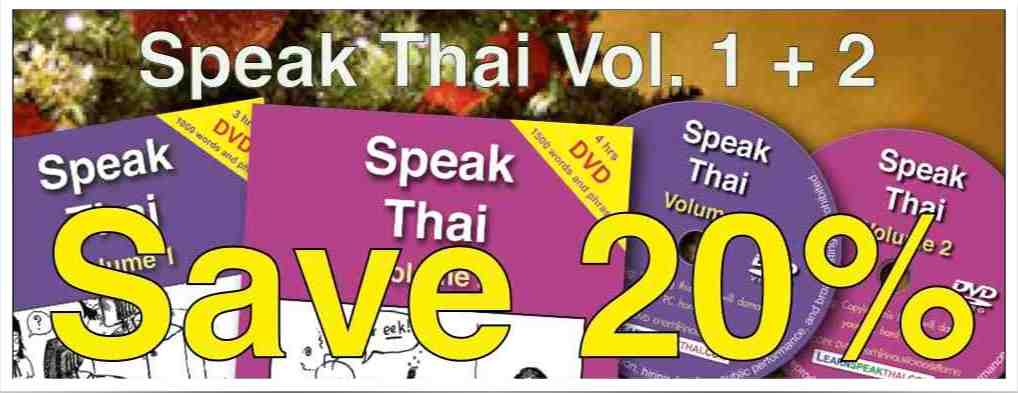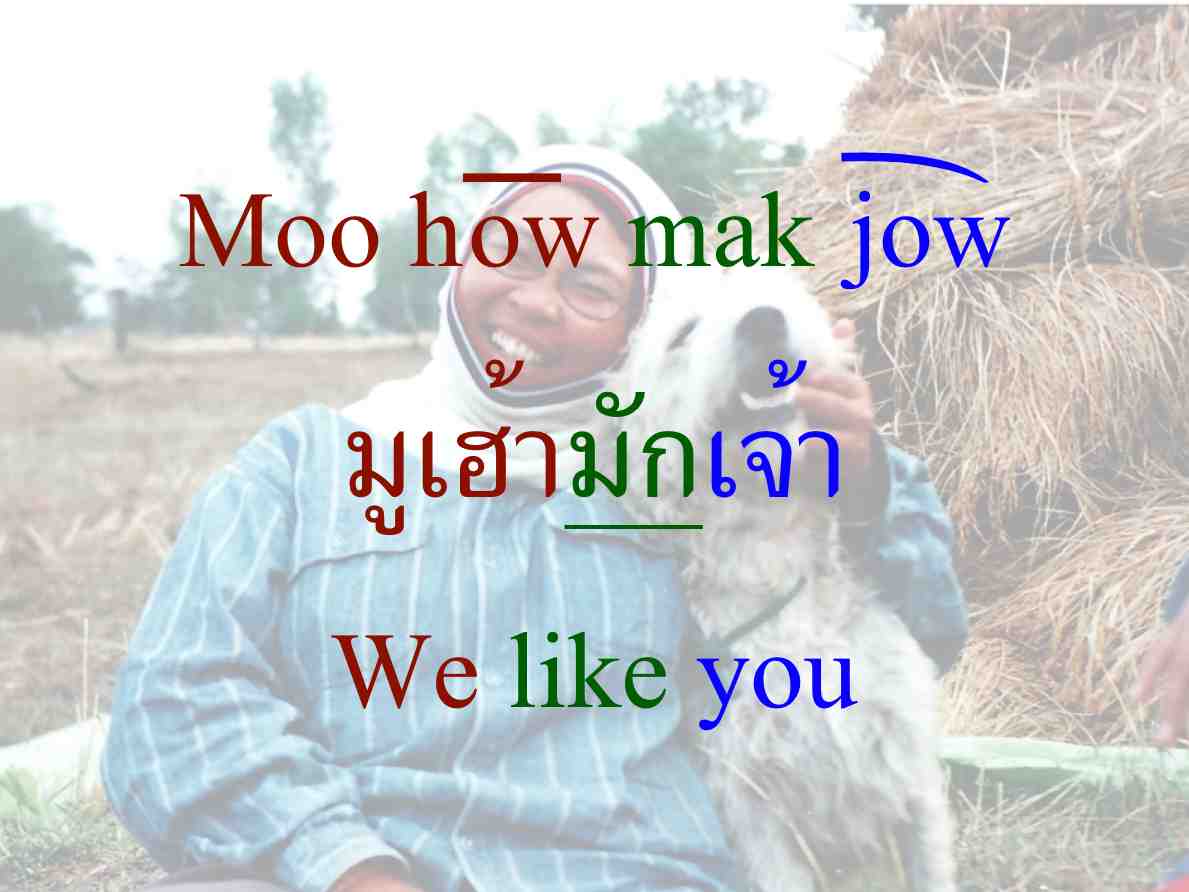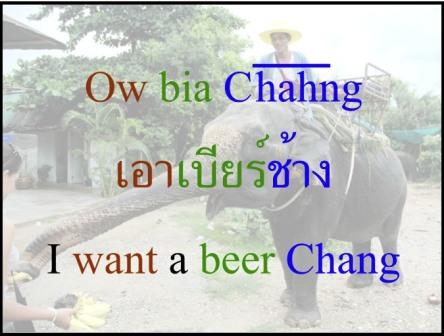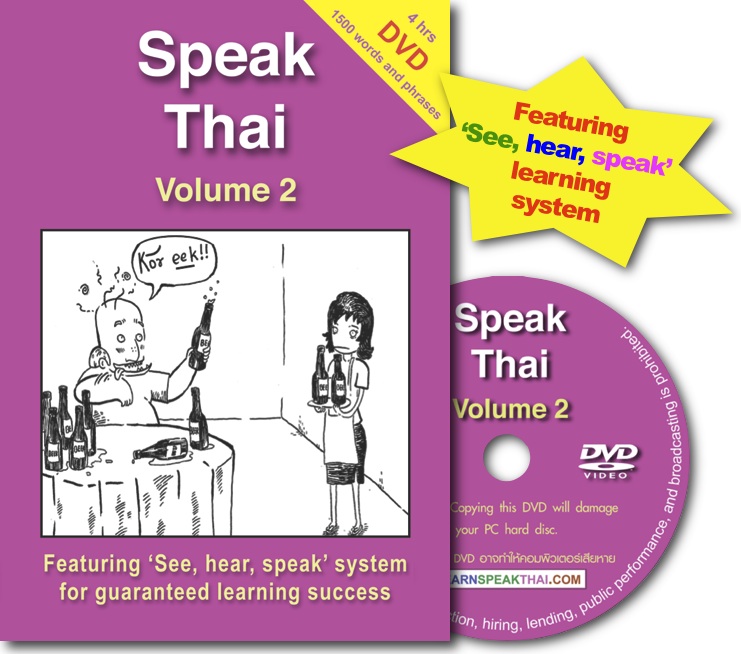|
 




Thai - Hello

Isaan Thai - I drink beer

Thai - What is your name?

Isaan Thai - We like you

Thai - I want a beer Chang

Isaan Thai - I miss you

Thai - Can we meet again?

Isaan Thai - I'll phone you tomorrow

Thai - Good luck

Isaan Thai - How are you?

 
Speak the language of the people you meet and love in Thailand.
Start learning today!
|

'Wonderful seller of a hard language made easy.' Ryan Woods, U.K.
Speak Thai Volume 2 Grammar
Speak Thai Volume 2 covers more fundamental grammar, language and word understanding you need to know to speak Thai successfully. Aspects of grammar are introduced in either distinct segments at the beginning of a chapter or are explained as and when they crop up in words and phrases. Whilst the list below may look daunting, rest assured, these aspects of grammar and word use are covered in a simple, interesting and easy to understand way.
NUMBERS, THE CALENDAR AND TIME
- Numbers, the calendar and time
- Tone practice
- Numbers: Use of Roman and Thai script numbers in Thai society
- Numbers: The use of ‘et’ rather than ‘neung’ to indicate 1
- Numbers: The word for ‘two’ when speaking on the telephone
- Numbers: The number nine, word for progress and auspicious numbers explained
- Numbers: Colloquial pronunciation of ‘yip’ numbers 20-29
- Numbers: Colloquial way of expressing 100, 1000, 10,000 etc.
- Numbers: How to express ordinal number
- Classifiers: Using classifiers with numbers
- Classifiers: The 20 classifiers you should know
- Classifiers: When noun and classifier are the same
- Classifiers: Using the general classifier ‘an’
- Time: Telling the time
- Time: Explaining the two different ways of expressing am times
- Time: Colloquial way of saying 1 pm
- Time: How the origins of Thai time keeping contribute to Thai time names
- Time: Use of ‘dtorn nee’
- Time: Use / non use of ‘nah-tee’
- Time: Words used to indicate degrees of time
- Calendar: Use of ‘wan nee’ when asking the time
- Calendar: How number of days in a month can help you remember how each month name ends
- Calendar: How end of month words omitted in everyday speech
- Calendar: How to express dates in Thai
- Time periods: Use of ‘dtorn’ to indicate a period of time
- Time periods: Combining time periods with day parts
- Time periods: Determining whether this and that words ‘nee’ or ‘nan’ are high tone or falling tone
- Time periods: Early and late words
- Time periods: Way of saying today, tomorrow, yesterday, everyday
- Time periods: This, next, last words
- Time periods: Indicating something happened a specific time ago
- Time periods: Indicating something will happen at a specific time in the future
- Time periods: Using ‘ny eek’
AROUND TOWN
- Around town
- Shopping: Use of ‘bahng’ in question words
- Shopping: Use of ‘an-nee’ and ‘nee’ to indicate this
- Shopping: Use of ‘wah’ after verbs ‘kit’, ‘poot’, and ‘bork’
- Shopping: Use of ‘rork’ when contradicting what has been said
- Shopping: Meaning and use of ‘cheui, cheui’
- Shopping: Thai words meaning change – money related and general
- Shopping: Positive word intensifiers – ‘mahk’, ‘jing jing’, ‘jang leui’, ‘mahk leui’
- Shopping: Negative word intensifiers
- Clothes: Use of want words ‘yahk’ and ‘yahk dy’
- Clothes: Expressing something is just right
- Clothes: Words for short object and short person
- Clothes: ‘To try’ words and phrases
- Clothes: Use of ‘gwah’ with adjectives to indicate an increased degree of a characteristic
- Clothes: Use of ‘noy gwah’ with adjectives to indicate a decreased degree of a characteristic
- Colours: Use of Thai word for colour ‘see’ as a noun and verb
- Colours: Explanation of composition of Thai colour names
- Colours: Words used to indicate light or dark color
- Fruit: Words used to indicate quantities
- Fruit: Use of ‘gi-loh’ and ‘loh’ to indicate kilogram
- Fruit: Use of classifiers when buying fruit
- Getting your haircut: Three different Thai words for ‘wash’
- The post office: Use of classifiers when asking for stamps
- Hotels: Explanation of words ‘horng deeo’ and ‘horng koo’ when asking for room
- Hotels: Use of ‘wan la’ and ‘keun la’
- Hotels: Use of ‘deeo’ or ‘neung’
- Hospital: Use of pre-fix ‘mor’ when addressing doctors
- Hospital: Explanation of non use of ‘I’ and ‘have’ when describing symptoms
- Hospital: Use of ‘reu seuk’ (feel) to describe emotions and feelings
- Hospital: Words used to describe various emotional states
- Hospital: Use of formal an informal words to describe vomiting
- Hospital: Colloquial way of saying hospital
- Hospital: Frequency words
- Hospital: ‘Keui’ (used to) and ‘my keui’ (have never) ) word meaning and usage
GETTING ABOUT
- Travel: Explanation of formal and informal words for traffic light
- Travel: Even and odd numbered days -‘wan kee’ and ‘wan koo’
- Travel: Use and meaning of ‘roo’ and ‘roo jak’
- Travel: Use and meaning of ticket names ‘bat’ and ‘dtua’
- Travel: Ways of expressing arriving
- Travel: ‘nang’ and ‘tee nang’
- Travel: Use of ‘rot’ and classifier word for vehicle ‘kan’ when talking about buses
- Travel: Use of ‘kon’ and classifier word ‘kon’
- Travel: Using the word ‘gap’ to say ‘with’ and ‘and’
- Travel: Explanation and use of word ‘tang mot’
- Giving directions: Importance of distinguishing pronunciation of ‘lang’ (behind) from ‘lahng’ below
- Giving directions: Use of reduplication to distinguish between word ‘gly’ (far) and ‘gly’ (near)
- Giving directions: Explanation and use of stop words ‘yut’ and ‘jort’
- Giving directions: Use of ‘mee’ to mean have and there is
- Giving directions: Explanation of Thai words for East and West
- Giving directions: Explanation of word ‘chiang’ in direction words NW, SW
EATING OUT, TELEPHONE CONVERSATION AND THAIGLISH
- Going out for a meal: Use of phrase ‘por ja roo-jak’ when asking for information from a person
- Going out for a meal: Using ‘gor dy’ to show how easy going you are
- Going out for a meal: Examples of phrase ‘gor dy’ in use
- Going out for a meal: Explanation of idiomatic expression ‘a-ry dee’ when being asked what you would like to order
- Going out for a meal: Use of words ‘sang’, ‘rap’ and ‘ow’ when being asked what you would like to order
- Going out for a meal: Ordering and the use of classifiers
- Going out for a meal: Key classifier words
- Going out for a meal: Non use of word ‘noy’ (little) with request word ‘kor’ when ordering a specific quantity
- Going out for a meal: Explanation of word ‘ruam’ / ‘ruam mit’ and use
- Menu decoding: Use of ‘nah’ and ‘man’ in one plate rice dish names
- Paying the bill: Words you can use to get the attention of serving staff
- Paying the bill: Use of word ‘noo’ as name (rat) and as affectionate term when addressing young child
- Paying the bill: Explanation of word origin and meaning of ‘chek bin’
- Paying the bill: Explanation of word origin and meaning of ‘gep dtang’
- Toilets: Use of the word ‘bpuat’ when describing the need to go to the toilet
- Telephoning: Explanation of word ‘toh-ra-sap’ as being both noun and verb
- Telephoning: Explanation of ‘toh-ra-sap’ becoming ‘toh’ in everyday speech
- Telephoning: ‘Ror sak kroo’ and ‘dee-o’ use
- Miscellaneous grammar: Gor
- Miscellaneous grammar: Conjunctions - and, and / with, and then, because, but
- Miscellaneous grammar: Indicating the frequency of an activity – always, usually, never
- Miscellaneous grammar: Indicating intended action – must / need, should, probably, might, perhaps
- Miscellaneous grammar: Comparatives – same / not the same
- Miscellaneous grammar: Comparatives – similar / not similar
- Miscellaneous grammar: Comparatives – same as / different
- Thaiglish: Explanation of 14 key characteristics with examples
LIFE IN RURAL THAILAND
- Animals: Explanation that word for buffalo is also a derogatory term
- Waking up in a Thai village: Use of ‘ahb-nam’ and ‘ahb’
- Waking up in a Thai village: Explanation of word ‘peuan bahn’
- Food gathering activities: Explanation of word ‘gep’ an usage
- Weather: Difference in meaning and use of words for cold ‘yen’ and ‘naow’
- Thai values: Explanation of ‘nam jy’
- Thai values: Explanation of ‘kwahm ga-than yoo’
- Thai values: Explanation of ‘sam neuk bun kun’
- Thai values: Explanation of ‘nap teu’
- Thai values: Explanation of ‘jy yen’
- Thai values: Explanation of ‘gehng jy’
- Thai values: Explanation of ‘riap roy’
- Thai values: Explanation of ‘torn dtua’
- Thai values: Explanation of ‘su-pahp’
- Thai values: Explanation of ‘sa-nuk’
- Thai values: Explanation of ‘sa-bai’
TRANSLITERATION GUIDE
- Phonetic transliteration: Low class consonants
- Phonetic transliteration: Mid class consonants
- Phonetic transliteration: High class consonants
- Phonetic transliteration: Short vowels
- Phonetic transliteration: Long vowels
For Speak Thai Vol. 2 grammar content:
Speak Thai Volume 2 Contents
Speak Thai Volume 2 Learn Speak Thai Home
|


















